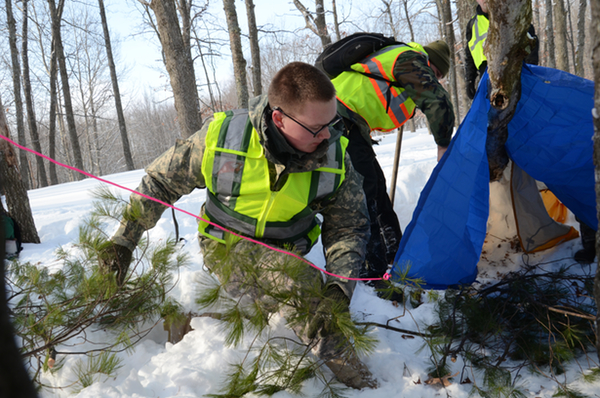When the call comes, these Michigan volunteers will be ready
Some wear uniform yellow vests, others camo snowsuits and mismatched knit hats to keep the cold off.
The search party spreads out at even intervals along an almost silent Camp Grayling back road, plowed but still packed with snow from the night before. Then, the order comes down on a small handheld radio: move forward 10 meters. And two days sitting in class, learning about winter survival, confronts the reality of hip-deep powder on a windy February afternoon.
Nobody is a pro here. The volunteers from every corner of Michigan find themselves working hard for every step. Some older people crawl on all fours up the first embankment into the tree line, others move methodically on snowshoes. When intervals get too far or too close, the group halts and resets. Eventually, well into the old-growth woods, they “find” their missing person – a young deaf girl lost in the woods.
The group erects up a shelter using only parachute cord and a tarp, builds a fire and creates an evacuation litter with another tarp and a couple tree boughs. In three days, people with few winter outdoor skills have potentially become lifesavers for their communities.
The Community Emergency Response Team program (commonly called CERT) is a training endorsement the Michigan State Police coordinates, as part of the Michigan Citizen Corps, with federal funding from the Federal Emergency Management Agency and Homeland Security. Basically, it provides first responders and law enforcement with additional trained manpower for emergencies and the occasional volunteer improvement project.
On the early February weekend the CERT program held its second annual winter survival training, more than 100 people from throughout the state came to the National Guard camp in Grayling, about 30 more than the previous year. Volunteers come from all variety of state and local groups, and range in experience from reserve Detroit Police Department officers to secretaries to retirees.
“We all have the same hats and just trade them,” said David Pratt, captain of the Frederic Township Fire Department and CERT coordinator.
CERT deploys its regional teams along the same geographic boundaries as the Michigan State Police, meaning there are eight major districts in the state. Pratt says his group alone in mid-Michigan has responded to such calls as traffic control during wildfires and highway closures, as well as assisting in lost-persons cases.
In 2010, volunteers were called to assist when a 7,500-acre wildfire in the Howes Lake area near Grayling left more than a dozen homes burned and residents fleeing for safety. Pratt said having the volunteers is an asset in large, rural coverage areas in Northern Michigan.
“We call them out even for major lane closures,” he said. “They volunteer and they love it. So, we use them all them time.”
In an era of dwindling local tax revenues, connecting volunteer assistance is playing a greater role in emergency planning.
There are now more than 2,200 registered CERT programs across the nation. Those programs try to give basic lifesaving skills, such as CPR and first aid, to unpaid people who have an interest in helping their communities.
Michigan is trying to centralize the volunteers under a separate, but related program called the Michigan Volunteer Registry, managed through the Michigan Department of Community Health’s Office of Public Health Preparedness. The registry offers volunteers a one-stop sign-up, without any future obligation. The state uses the information to create a list of pre-screened citizens, some of whom have specialized skills, some who may just be willing to help.
Once signed up, a participant is asked to select a group – something like CERT, or Michigan’s State Animal Response Team, which recovers animals during a disaster. Others cover medical fields and even Neighborhood Watch Programs.
Gary Rapelje, coordinator for the Michigan Healthcare Coalition in Region 7, in the northwest Lower Peninsula, says the registry is critical for Michigan in the event of a health emergency or natural disaster.
But the biggest step, he said, is connecting the willing participants with the training and screening before a disaster strikes.
“These are volunteers who are more than willing to do anything," said Rapelje. "Just look at them here (in Grayling) for three days on their own dime and driving up from downstate two or three hours, to give their time.”
See what new members are saying about why they donated to Bridge Michigan:
- “In order for this information to be accurate and unbiased it must be underwritten by its readers, not by special interests.” - Larry S.
- “Not many other media sources report on the topics Bridge does.” - Susan B.
- “Your journalism is outstanding and rare these days.” - Mark S.
If you want to ensure the future of nonpartisan, nonprofit Michigan journalism, please become a member today. You, too, will be asked why you donated and maybe we'll feature your quote next time!


 Volunteers undergo Community Emergency Response Team training in an outdoor setting at Camp Grayling last month. Once trained, they are available to help law enforcement and others in a variety of volunteer situations, such as missing persons or natural disasters. (Bridge photo by Brandon Hubbard)
Volunteers undergo Community Emergency Response Team training in an outdoor setting at Camp Grayling last month. Once trained, they are available to help law enforcement and others in a variety of volunteer situations, such as missing persons or natural disasters. (Bridge photo by Brandon Hubbard)